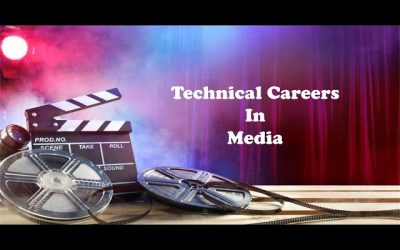What is Film & Television Industry?
The film & television industry is an entertainment industry. Film and TV professionals with technical knowledge have the power of imagination, creating innovative new ways to tell a story. Film & Television Production plunges into the entire creative process. Here, all aspects of the art of storytelling and develop the ability to take audiences on emotional journeys using a wide array of cinematic skills.
From ideation, where movies and television are born, through creative producing, where they are developed and nurtured, to the key disciplines of screenwriting, producing and production management, directing, cinematography, editing and sound. In most cases, the industry is focused on films, ads, serials as a medium for entertainment, but in some situations, it may use it for educational purposes as well.
When Can I Enroll for Film & Television Industry?
COURSE | ELIGIBILTY | DURATION |
*Diploma Course | 10th /12th | 2 Years to 3 Years |
*Bachelors/B.A/B.Sc [film making]/Performing Arts | 12th | 3 – 4 Years |
*Post Graduation Diploma | Any Graduate | 3-4 Months to 3 Years |
*Post Graduate Certificate Course | Any Graduate | 1 Year |
Certificate Course | 10th | 1 Month to 1 Year |
Part Time Course | N.A | Per Session |
Course in Sound Recording requires Physics as a subject
*Personal Interview for Selections
What Personality Traits Are Required for Film & Television Industry?
- Artistic flair
- Ability to work cooperatively
- Sense of responsibility
- Ability to work under deadlines
- Leadership quality
- Excellent organisational and planning skills
- Good time management and budget awareness
- Great physical stamina
- Strong visual sense
- Good communication skills as well as administrative skills.
What Aptitudes Are Required in Film & Television Industry?
- Abstract Reasoning
- Space Relations
- Numerical Ability
- Verbal Reasoning
- Mechanical Reasoning
- Psychomotor Ability
- Closure Ability
What are Job Prospects Available in Film & Television Industry?
- Director
- Assistant Director
- Make Up Artist
- Casting Director
- Screenwriter
- Cinematographer
- Film Director
- Crew member
- Actor
- Music Director
- Singer
- Composer
- Supporting Actor
- Producer
- Chorographer
- Production Designer
- Costume Designer
- Editor
- Dialogue Writer
- Technician
- Sound Artist
- Art Director
- Makeup Artist
Frequently Asked Questions For Film & Television Industry
1. What is the Film & Television Industry?
The film and television industry encompass the creation, production, distribution, and exhibition of films, TV shows, documentaries, and other visual content for entertainment, information, and education.
2. What are the different roles in the Film & Television Industry?
The industry offers various roles, including:
- Director
- Producer
- Screenwriter
- Cinematographer
- Editor
- Actor/Actress
- Production Designer
- Sound Designer
- Costume Designer
3. How do I start a career in the Film & Television Industry?
Starting requires gaining experience through internships, film school, workshops, networking, and building a strong portfolio.
4. What skills are necessary for success in the industry?
Essential skills include storytelling, teamwork, communication, creativity, technical proficiency in filmmaking tools, and adaptability.
5. Is a degree in film or media necessary for a career in the industry?
While not mandatory, a degree in film or media can provide comprehensive knowledge and valuable industry connections.
6. How does technology impact the Film & Television Industry
Technology plays a significant role in production, post-production, special effects, distribution, and viewing experiences through advancements like CGI, streaming platforms, and virtual reality.
7. What is the process of making a film or TV show?
The process involves pre-production (planning), production (shooting), and post-production (editing, sound, visual effects) stages.
8. What are film festivals and their significance?
Film festivals are events where films are screened and celebrated. They provide exposure, recognition, and networking opportunities for filmmakers.
9. Are there opportunities for freelancers in the industry?
Yes, many roles, such as cinematographers, editors, and visual effects artists, operate as freelancers on a project basis.
10. How can I break into acting in film and television?
Start by building an acting resume, attending auditions, enrolling in acting classes, and networking within the industry.
11. Is diversity and representation important in the industry?
Yes, diversity and representation are crucial for reflecting diverse cultures, backgrounds, and perspectives accurately.
12. What are the challenges in the film and television industry?
Challenges include competition, project funding, tight schedules, industry changes, and balancing creative vision with commercial success.
13. How does the industry handle intellectual property and copyrights?
Copyright laws protect original works. Contracts and legal agreements are essential to define rights, ownership, and usage of content.
14. Can I work in both film and television?
Yes, many professionals work in both mediums, applying their skills to various projects and genres.
15. Are there opportunities for international collaborations in the industry?
Yes, collaborations between filmmakers, actors, and production companies from different countries are common and enrich the global cinematic landscape.
16. How does the film and television industry impact culture and society?
Media influences cultural narratives, shapes public opinion, raises awareness, and provides platforms for discussing social issues.
17. What is the future of film and television in the digital age?
The digital age brings innovations like streaming platforms, virtual reality content, and interactive storytelling, reshaping how content is produced and consumed.
18. Can I create independent content outside of the traditional industry?
Yes, the rise of online platforms and independent distribution channels allows creators to produce and showcase their content to a global audience.




